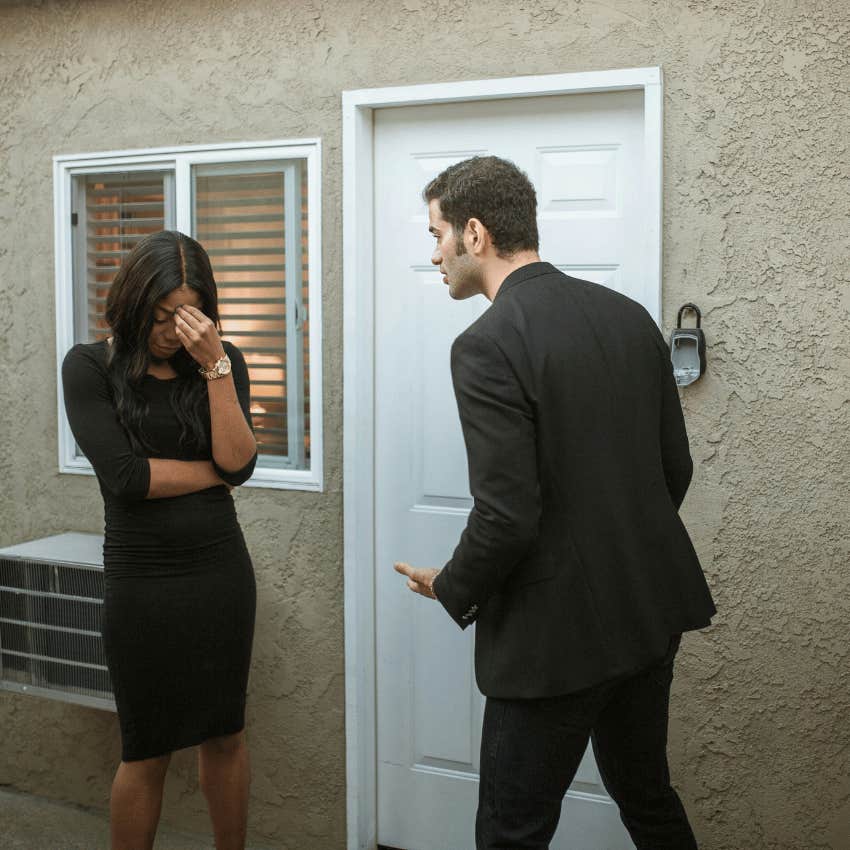Why I Stayed
Some dynamics of my marriage were unique, but I stayed for the same reasons so many women stay.
 Tatyana | Canva
Tatyana | Canva When people ask my husband and me how we met, he likes to say, “She was bartending, and I was drinking.”
Our meet-cute should have been my first red flag. The man who would become my husband wasn’t someone who occasionally came in; he was one of the bar’s many regulars. Advice to bartenders everywhere: Don’t date a regular. Or at the very least, don’t marry one.
To be fair, he was one of the bar’s most respectful regulars, though the standards of respect for women in that particular bar were staggeringly low. The first time we met, he requested a Bud draft, and he even said “Please.” When he smiled, his white teeth glimmered against his rich brown skin, revealing his signature dimples.
Those dimples made me woozy. Maybe I stayed for the dimples. When we met, we were both seeing other people. Both those people left us around the same time, then both decided they wanted us back. But it was too late. He had already given me his number, and I had already called him, and one thing had led to another.
I saw in him someone who was lonely and hurting and a little lost. Smart, but consistently underestimated. Motivated, but consistently denied opportunity. Hungry for love and belonging, but consistently misunderstood. It’s not that I set out to save him.
But I felt for him, and I enjoyed spending time with him, and the physical chemistry between us was undeniable. I saw opportunities here and there to help him, like leveraging my well-honed Craigslist skills to find him a better living situation, packing a Tupperware of leftovers for his long EMT shifts, or drafting a letter in “white speak” to the owner of his paramedic school requesting permission to defer a payment. I could always generate empathy for him from white people that he was unable to generate on his own.
The warning signs were there from the beginning — always easier to see, of course, in hindsight. There was the regular alcohol overconsumption, yes, and the erratic behavior that I referred to at the time as “moodiness.” Whenever we hung out during those initial months, I’d emotionally prepare myself for our time together by looking first at his eyes. Were they warm and relaxed? Dark and brooding? Tight and strained with rage?
He was scary when he got angry, but in the beginning, the rage was rarely directed at me. It was mostly directed at his ex-girlfriend, also the mother of his son. He made lots of negative generalizations about females, to the point that even early on, I wondered aloud if he hated women. He told me I was being ridiculous. He’d just had some negative experiences with women, he said, starting with his mother.
His behavior was easy for me to justify. He had moved out to New England for his ex-girlfriend and son, and he now found himself navigating major life transitions, thousands of miles from home, with no social network and no financial safety net.
His son’s mother was the jealous type, and when she found out he was dating again, she became somewhat unhinged. She broke into his house and cut up all his clothes; later, she would climb up my fire escape while her son watched from the car. The rage he directed at his ex seemed perfectly understandable. I felt it, too.
 BearFotos | Shutterstock
BearFotos | Shutterstock
Our relationship progressed, and we did all the things. We moved in together, then moved to a different state together. We got married and then bought a condo. We had a baby and then moved across the country. We bought a house, then we had another baby.
It wasn’t a bad life we built. There were moments of great joy, moments of quiet contentment. He said I was his soulmate, and I believed in his love for me. I never worried he would tire of me, or trade me in for a younger model. I frequently made him laugh, and I delighted in the way he threw back his head, in the crinkles around his eyes, and his dimples, yes, like pinpricks at the corners of his lips.
But the rage and unprocessed trauma were always simmering beneath the surface, sometimes exploding in ways I found frightening, and more frequently directed at me. Except for a glorious eight months during which he was in recovery, our recycling bin was always overflowing with bottles or cans.
As our children consumed more and more of my energy, I had less and less left over for his emotional roller coasters. I grew to live in fear of triggering him, or of our children triggering him. I was concerned for our emotional safety, yes, but also, I simply didn’t have the time or space to deal with the fallout. I came to more or less accept, but quietly resent, the stark emotional and mental labor inequities in our so-called “partnership,” telling myself I was better at handling the stress.
It took me nearly 16 years of marriage, 20 years since we started dating, to reach my breaking point. And the question I keep asking myself — now that we’ve separated and I’ve experienced the novelty of prioritizing and processing my feelings — is, why did it take so long? Or in other words, why did I stay?
Why did I stay in a terrible marriage for as long as I did? One word: inertia.
Extricating oneself from a marriage, particularly when there are children involved, is no small thing. Even when my marriage itself was exhausting, the prospect of making any drastic life decisions while also shuttling kids to sports practices and sorting through their old clothes, keeping the house in some semblance of order, figuring out dinner, and showing up to the job that occupies half of my waking hours during the week seemed completely impossible. From a logistical standpoint, yes, and also a financial one.
Inertia is a powerful force in its own right, but there are other reasons I stayed. And despite the more unique dynamics of our relationship, particularly as an interracial couple, I’m quite sure many women will be able to relate.
Helper mentality
I appreciated helping my husband, particularly in the beginning. I experienced the effects of subtle and not-so-subtle racism right alongside him, and I was eager to leverage my white privilege for his benefit. Besides, he wasn’t a charity case — he was putting in the work, first to get his paramedic license, then his bachelor’s degree, then ultimately his doctorate.
My husband always said that we made a good team, and we did for a while. But at some point, it stopped feeling like a team effort. Instead, my help was demanded and frequently taken for granted.
But I kept helping because … well, helping is a good thing, right? After all, if everyone consistently helped one another out, the world would be a much better place. The problem, when it comes to heterosexual relationships, is that women have been socially conditioned to help in ways that their husbands have not. Men do; women help — this dynamic is foundational to a patriarchal system.
In religious communities, men converse with God while women make casseroles. In workplaces, men talk while women take notes. In politics, men campaign while women smile and stand by their sides.
Over time, our so-called “helpful nature” begins to feel core to our identity. We convince ourselves that our partners need our help. My husband didn’t just need me for my white privilege; he needed me to make him coffee in the morning. Like a good wife, for years I helped him fill that need. It wasn’t until recently that I discovered he doesn’t know how to work the coffee maker. (To be clear, we have a basic drip coffee maker, not some fancy espresso machine.)
Our relationship might be complicated by interracial dynamics, but this learned helplessness is prevalent across heterosexual marriages. As wives, we come to associate much of our self-worth with our ability to save our husbands from their incompetence. We truly start to believe they could never navigate the world on their own.
Bowling Green State University's 2010 research on family structure and child outcomes has taken on a new urgency with the ongoing federal initiatives to encourage healthy marriages, especially among the disadvantaged. Several large, federally funded demonstration projects are underway to evaluate whether education programs can facilitate healthy relationships and, ultimately, marriage among populations where marriage rates are low and non-marital childbearing is high.
 RDNE Stock project | Pexels
RDNE Stock project | Pexels
Sunk cost fallacy
Marriage is not just an institution; it’s an investment, starting with the inane amount of money, time, and labor we pour into our weddings. Society puts a lot of pressure on the Big Day, mostly because weddings help keep the gears of capitalism grinding, and the lion’s share of this pressure is placed squarely on women’s shoulders.
As Cindy Savage, a self-described “queer, fat, feminist wedding planner” puts it:
All of these expectations add up to the same kind of stress women face for the rest of their lives — how to balance their own emotional needs with those of everyone around them and still put on a happy face. (Because it’s the best day of your life and you better look like you’re enjoying it!)
It’s another second shift, but it’s a third shift because there’s still that whole domestic project management thing happening every night. Engaged women spend, on average, 10–15 hours per week for 12 to 18 months planning their weddings. That’s over 500 hours at the low end and more than 1000 hours at the max, and so much of that time is spent managing the mental load and other people’s feelings.
That’s the equivalent of 13 to 26 UNPAID work weeks to plan a single day. No wonder wedding planning is one of the most stressful and exhausting times in a woman’s life.
I didn’t invest nearly this much time or energy into my wedding, but I still felt the pressure to take on the planning, the project management, and the emotional management — just as I would for the rest of my marriage. Separating from my husband often seemed inconceivable because all those hours over all those years would feel like wasted time.
After all, aren’t investments supposed to eventually pay off? I often dreamed of the day when we could just sit on the porch together, having released our intelligent, well-adjusted, emotionally mature children into the world, and I would finally be able to enjoy the security and comfort of long-term commitment without the vexing inequities and routine exploitation of my labor and time. I’d be the woman who gritted her teeth through the rough patches and weathered the storms because the payoff was someone by my side to bear witness.
If I bailed prematurely, then what was it all for?
Findings from a 2017 study showed that spouses' daily help, specifically emotional support, was associated with spouses reporting fewer physical symptoms when perceptions of partner appreciation were high. This reflects that spouses who perceive their partners as appreciative feel less stressed as support providers and more mutually supported by their partners.
Arrival fallacy
It wasn’t just the front porch that I dreamed about. I spent most of my marriage dreaming of various moments when we would finally “arrive.” That meant a lot of time dismissing niggling doubts and instead reassuring myself with “as soon as.”
As soon as he graduates from paramedic school…
As soon as we buy a home…
As soon as he graduates from college…
As soon as our daughter starts kindergarten…
As soon as he gets his doctorate…
As soon as our son starts kindergarten…
As soon as he gets a job…
We live in a goal- and achievement-oriented culture, a culture in which external markers of success are supposed to lead to eternal happiness and well-being. We always believe our happily-ever-after lurks just around the corner, just after this next promotion or purchase or milestone.
Much of our marriage was predicated on arrivals. Having been born white and middle-class, with the advantage of a stable childhood, I more or less had my life together when we met. I’d graduated from college and was bartending on the side while trying to get a nonprofit up and running. Though I was just scraping by when we started dating, my future was bursting with potential.
My husband was the one who was clawing his way out of a confusing, chaotic adolescence and young adulthood, which had included a stint in jail for a nonviolent felony. For so many years, it was his arrival in a stable, professional, middle-class world that was our North Star.
True, the North Star kept shifting, but it was always there on the horizon. Whenever his signature “moodiness” hit, whenever I felt like his emotional punching bag, whenever the expression on his face in the morning filled me with foreboding, I told myself, “As soon as…”
Eventually, we did, reach that elusive North Star — his graduation from a doctoral program — and for a time, it did seem that we’d “arrived.” Our kids were both in elementary school, still cute but much more self-sufficient. We finally enjoyed some semblance of financial stability, and he was working a job he enjoyed.
But then life continued to happen. There was still the stress and daily slog all working parents contend with, and we’d lost our North Star. Was this it? Was this what we’d toiled toward for the better part of 15 years? What were we trying to accomplish now? Were we even on the same team anymore? What game were we playing, anyway? And how in the world did anyone win?
The arrival fallacy stems from the idea ingrained into many of us since we were children that the key to happiness is having a good job, making lots of money, getting married, experiencing notoriety in our careers—generally having a forward-thinking, goal-oriented mindset. However, research has shown that those things don’t bring us happiness, at least not long-term, as explained in a 2017 study by Harvard University Health.
Social stigma
Society doesn’t look fondly upon anyone who initiates divorce, but there is no doubt we hold women in more contempt. If a heterosexual man initiates a divorce, the first thing we wonder is, what’s wrong with the wife? Did she become insufferable? Did she get fat? Did she, God forbid, age?
But a woman who initiates a separation or divorce? Not only is she traumatizing her children and blowing up her family, but oh, she must be difficult. She must be selfish. Maybe she’s crazy. She’s probably asking for too much. Her expectations must be unrealistic.
I’ve been a “good wife” and a “good mother” for 16 and 13 years respectively; divorce would mean losing all my street cred. I now see in other people all the silent judgments I once made myself. I mean, divorce was fine for other people, but I was fully convinced that I could never go that route. I cared too much about my family, about my children, about my husband.
I recently reached out to an acquaintance who went through a divorce a few years ago to let her know about my current situation. She said, “I’m sorry to hear that. Also, congratulations.”
It was the most perfect response. I had yet to be explicitly congratulated for taking this momentous step. The congratulations for getting married and having babies were laid on thick, but no one else had congratulated me for taking the seemingly impossible leap toward ending my marriage.
I’m lucky to have close friends and family who have been enormously supportive; I’ve also felt taken aback by other people’s reactions. More than one person has not so subtly shared their unsolicited opinion that I should stay married for the sake of the children. Others ask if I worry about getting lonely.
 Karolina Kaboompics | Pexels
Karolina Kaboompics | Pexels
There’s one reason people stay in marriages that I haven’t mentioned yet. What about love? Don’t I love my husband?
Yes, I do, sometimes despite myself. But love, I’ve found, doesn’t conquer all. In the context of marriage, love has become all tangled up in a big hairy ball of social expectations, power imbalances, emotional abuse, and labor exploitation. I will never again build a long-term future, much less enter into a legally binding contract, based on the flimsy premise of enduring romantic love.
Having experienced a taste of life on the other side of the marriage fence, the prospect of returning is as inconceivable as the prospect of leaving was just a few short months ago. My husband’s behavior during our separation has only reinforced what I already knew, but for so many years couldn’t admit to myself.
I can’t help him out of his trauma or addiction. My investment of time, labor, and love is unlikely to pay long-term dividends. We will never really “arrive.” And I have to prioritize my well-being, not to mention the long-term well-being of my children, over any worries about what people might think.
I have never cried so much for four months, and I have never felt so much serenity. Separation can lead to both an ending and a beginning; it can simultaneously give rise to great grief and great relief. I don’t even know yet if I regret staying all those years. But either way, I’m ready to start my second act.
Kerala Taylor is an award-winning writer and co-owner of a worker-owned marketing agency. Her weekly stories are dedicated to interrupting notions of what it means to be a mother, woman, worker, and wife. She writes on Medium and has recently launched a Substack publication Mom, Interrupted.

